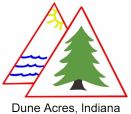Invasive Plant Prohibition
Dune Acres has long been noted for the incredible number of plant species that occur here. Even before the town's incorporation in 1923, botanists and plant enthusiasts flocked to "Mineral Springs" to enjoy and study the area's world-renowned flora. In fact, the floristic diversity in and around Dune Acres is on par with virtually anywhere in temperate North America.
In order to preserve this rich natural resource, in June 2021 the Town Council amended Chapter 14, Article II of the town code to prohibit the introduction of certain plants species which are recognized as invasive. The amended code does not require that invasive species already existing on a site be removed—though the Town urges property owners do so—it prohibits new plants from being planted, transplanted, divided, intentionally propagated, etc.
The list of prohibited species was compiled and is maintained by the Indiana Invasive Species Council, established by the state legislature to "enhance the ability of government agencies to detect, prevent, monitor, and manage new and long established invasions, as well as increase public awareness about invasive species."
To view the list of prohibited species and to learn more about the IISC and its mission, please visit the IISC website. The list will be updated periodically.
Please note the list includes species that are prohibited by Indiana statute, but also a number of common garden plants that are available at nurseries and garden centers and through landscaping contractors. Just a few examples of invasive plants that may be encountered include burning bush, Norway maple, privet, English ivy, periwinkle, maiden grass, and highbush cranberry Viburnum.
The Town encourages property owners to learn about the flora of the Indiana Dunes and how to recognize native species that may already be present on residential property. Before initiating landscaping projects, consider that the existing groundcover, plants or trees may be valuable or even rare. For resources about identifying native species, invasive plants, and how to become a good environmental steward, visit town hall or contact the office of the clerk-treasurer.
